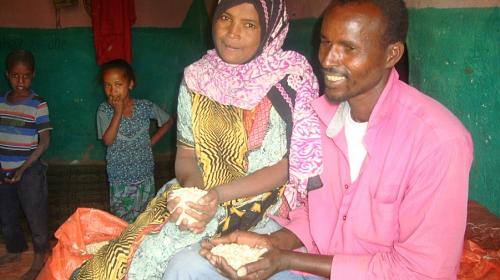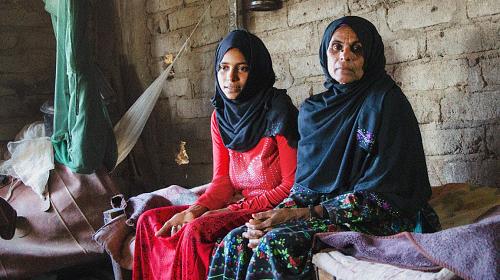
How does a family go from hopelessness to a bright future? With a grant worth slightly less than a penny, a training, and a whole lot of hard work. Don’t buy it? Just ask Aliyi—a farmer in Ethiopia.
Even in a good year, Aliyi Mumed could only grow enough grain to feed his family for about eight months, leaving four months when they all struggle for the next meal. In good years, with income from khat, his cash crop, he could just barely scrape together enough to send his kids to school with notebooks and pens.
2016 was not a good year. The El Nino drought devastated Aliyi’s fields. He produced only enough grain to eat for 2 months, and no cash crop at all. A shock like that doesn’t just mean going hungry this year—it can destroy hope for the future—like how to eat next year, and how to keep your kids in school so they can have a chance for something better.
Aliyi struggles to describe what this meant for his family.
"I have no words to tell you how I suffered; I had nothing to feed my family, and had no seed to plant. With no food to eat and no income to send to my oldest son to college, I sold the only ox I have to let him finish his college diploma. For the future, I could only pray."
But something changed for Aliyi and his family. The European Union Drought Recovery Project selected them to receive 6.25 kg of corn—something that costs less than one cent in the international market. The project also provided training in the best ways to plant to get the best harvest. With that seed and their new knowledge, Aliyi and his family got to work. They planted their land and grew 136 kg of corn to eat, and another 544 kilograms to sell. That’s 25% more than they had ever grown before, even in a good year.
Aliyi didn’t stop there. He invested in sorghum seeds on his own, and used the new techniques he know so well that he grew enough to feed his family for the whole year. Then he bought some goats to fatten and sell to replace his khat crop.
By next year, Aliyi is sure that he will have enough money to replace the ox he sold so his son could stay in school. This is his biggest priority, because, as he says,
“I remained in darkness without education, I don’t want my children remain the same. I want to secure my food and educate my children at any cost I can.”
Aliyi says the project supports him like only his parents every have. ““The European Union recovery project is like our mother and father. In a short time, it has saved our life.”
But having his life back now is just the beginning. Aliyi is already looking to the future.
"In this one year, the project has given me a lesson and for many years to come I can prevent hunger."
Aliyi and his wife, Ahiya Amed, have also started saving in the project-supported Village Savings and Loan Association. Starting at just 5 ETB (€0.20) a week, they have saved 160 ETB (€6.61). Lot of people use loans to start businesses, but Aliyi and Ahiya have other plans. They used their loan to buy their daughters’ school books for this year. They are determined that their family will have a future.

